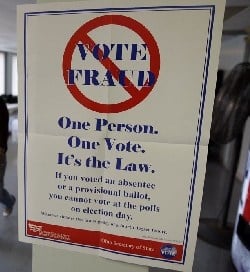September 7, 2020
by: Thomas R. Cuba, Ph.D., Special To The Free Press
There is a lot of chatter regarding how we might not be able to vote in person this fall. Many people are promoting vote-by-mail and many others are screaming about voter fraud.
Both are missing the point. However, valid points do remain to be made, even if ancillary. The easy one to address is that of fraud. Voter fraud occurs because there are fraudulent people who take fraudulent action to achieve their ends. In balance with those fighting fraud, the question becomes how much fraud occurs and whether or not the fraud changed the outcome of an election. Fraud will happen and fraud will be discovered no matter what the method of voting.
A much more undesirable circumstance arises when considering Absentee Ballots and the practice of Early Voting. The most recent example of the problem that can arise occurred in primaries during the 2019 cycle. The fact is that, using these two methods, votes were cast for candidates who had dropped out of the race by the time the votes were counted. Were that not the case, outcomes might well have changed.
During the same passage of time between the ballot being mailed and counted, other events continue to happen as well. Debates continue. Rallies continue. Surprise revelations continue. It is possible, if not probable, that decisions may have been different, given the impact of these events.
A truthful inspection of why we have Absentee and Early voting reveals that both methods revolve around convenience, wrapped in assurances that everyone will have the ability to cast their vote. People have jobs. People are homebound, in the hospital, deployed, or unable to travel. These impediments are easily resolved without resorting to alternative means of voting. Accommodations such as declaring voting day a mandatory holiday during which even essential workers are limited to four-hour shifts; where busses are rerouted to stop at every polling place, during which fares are reduced to zero, where taxi cabs, church busses, and wheelchair transport services are free to the voter, and during which government employees collect ballots from care facilities where large numbers of people are unable to travel to the poll.
But that isn’t the point.
The undesirability of Early and Absentee on Demand voting is that the methods cheapen the spirit of casting the vote itself. It dilutes the sense of both duty and participation that we experience when we take the time to go to the poll, meet the requirements needed to cast our vote, and do so as our civic participation in our government. Casting a vote in person elevates our understanding that we, the people, really are delegating portions of our authority to live as free men and women to others who would represent our needs, and do so on a temporary basis, subject to our approval during the next cycle.
About The Author: Thomas R. Cuba, Ph.D.
Raised a simple Missouri farm boy, Tom managed to attend a British Prep School before commencing a college career that would culminate in a Doctorate Degree in Marine Ecology. He also served as an Intelligence Officer in the U.S. Navy, and as a scoutmaster, SCUBA instructor, Wilderness Survival Instructor, and Firearms Instructor.
Tom has worked as an ecologist in both government and private practice, as well as a freelance nature photographer and computer programmer.
Now, a father and grandfather, Tom offers life lessons in the form of stories about the challenges people face and conquer as well as socio-political essays. To that end, his first lesson is always his favorite quote. “Failure is the whetstone of success.” ~ T. Leith Rettie, 1884.
You can read more from Tom on his site by clicking here.
